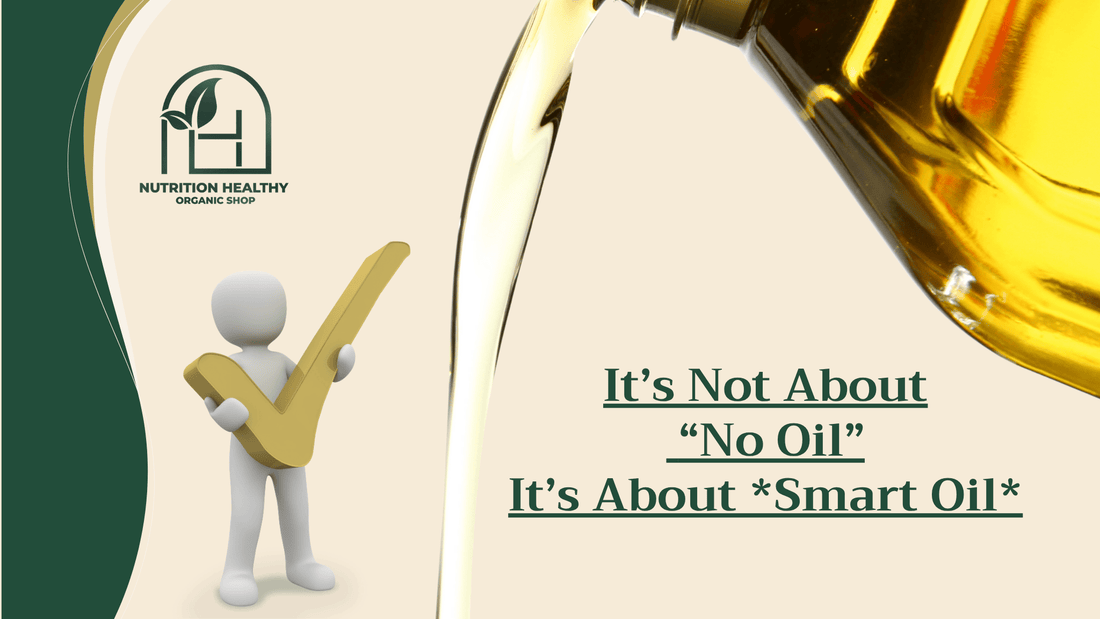
It’s Not About “No Oil”—It’s About Smart Oil
🧴 The Big Fat Question: Should We All Be Eating Less Oil?
For years, we’ve been told that oil = fat = bad. Low-fat yogurt, no-oil stir-fries, steamed everything… sound familiar?
But here’s the truth: Your body needs fat—just not all types, and not in excess. The trick isn’t to fear oil; it’s to understand it.
Let’s break it down.
🧠 Why Your Body Needs Fat
Fats (including oils) are more than just flavor carriers. They’re essential for:
- Brain health – Your brain is about 60% fat!
- Hormone production – Especially important for women’s health
- Cell structure – Every cell in your body has a fatty membrane
- Nutrient absorption – Vitamins A, D, E, and K need fat to be absorbed
- Satiety – Healthy fats help you feel full and satisfied
So yes, completely cutting out fat isn’t healthy—it’s harmful.
🥑 Good Fat vs. Bad Fat: Know the Difference
Here’s where things get important. Not all fats are created equal.
✅ Healthy Fats (Eat in Moderation)
- Unsaturated fats: Help lower bad cholesterol and protect your heart
- Found in:
- Olive oil
- Avocados
- Nuts & seeds
- Fatty fish like salmon
- Canola & Sacha inchi oils
❌ Unhealthy Fats (Limit These)
-
Trans fats: Man-made and harmful—linked to heart disease
- Found in: packaged snacks, fried fast foods, margarine
-
Excess saturated fats: Found in large amounts in fatty meats, butter, cream
- Small amounts are okay, but don’t go overboard
🍳 So... Is Less Oil Always Better?
Not really. Here’s the truth:
- Using too much oil (even healthy kinds) = extra calories = weight gain risk
- But using no oil at all = missing key nutrients & satisfaction
The smart move? Use the right type of oil, in the right amount.
🧴 How to Choose and Use Cooking Oils Wisely
Here’s a quick guide to oil that won’t make your head spin:
| Oil Type | Best For | Smoke Point | Notes |
|---|---|---|---|
| Olive Oil | Salads, light sautéing | Medium | Rich in antioxidants |
| Avocado Oil | High-heat cooking | High | Mild flavor, heart-friendly |
| Coconut Oil | Baking, occasional use | Medium-high | High in saturated fat |
| Canola Oil | General cooking | Medium-high | Neutral flavor |
| Sacha inchi Oil | Stir-fries, dressings | Medium | Strong, nutty aroma |
💡 Tip: Avoid reusing oil many times—it breaks down and can release harmful compounds.
🥗 Everyday Tips for Healthier Oil Habits
- ✅ Measure your oil – Don’t just pour from the bottle. A tablespoon goes a long way!
- ✅ Use non-stick pans to reduce how much oil you need
- ✅ Try roasting or steaming and drizzle oil afterward for flavor
- ✅ Balance with other fats – like nuts, seeds, and oily fish
- ❌ Avoid deep-fried foods too often—even at home
💬 Final Thoughts: It’s Not About “No Oil”—It’s About Smart Oil
Eating less oil can be healthier—if it means cutting out excess and unhealthy fats. But eliminating all fats? That’s a one-way ticket to low energy, poor skin, and hangry moods.
Instead, aim for a balanced approach: Choose good fats. Cook wisely. And enjoy the flavor. After all, a little olive oil on roasted veggies or a few drops of sesame oil in your stir-fry can be both delicious and good for you.
So next time someone says “I don’t eat oil because it’s unhealthy,” you can smile and say, “It’s not about eating less fat—it’s about eating the right kind.”
